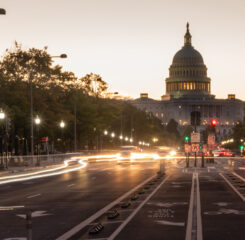HUD Allows Key Deadline Flexibilities for CSP Requests
On October 7, HUD published an FAQ document to answer questions from LeadingAge and others about COVID-19 Supplemental Payments (CSPs), including the need for key deadline flexibility that will allow housing providers more time to make COVID-19 related capital improvements to properties.
The current CSP request round features critical new reimbursable cost categories, including expenditures related to internet infrastructure installation, back-up generator installation, and ventilation system updates. However, HUD’s guidance for completing purchases and requesting reimbursement for COVID-19 costs initially included an October 31, 2021 deadline to complete purchases for reimbursement – an impossible timeline for projects trying to line up internet or generator installation projects.
In reponse to strong advocacy by LeadingAge, HUD has agreed to offer an additional 5 month period within which to complete capital cost expenditures and installation, giving housing providers until March 31, 2022 to complete eligible capital projects. Providers making use of the extended deadline will need to submit supporting documentation by April 8 demonstrating that the project was completed, and may receive reimbursement payments later than HUD’s late-February timeline for request payouts. Operating costs reimbursement requests still need to adhere to the October 31 expenditure deadline.
LeadingAge applauds HUD’s deadline flexibility and will continue to work with housing provider members to get access to cost reimbursements.
Additional Time Provided for Capital Project Expenses and Completion
HUD’s FAQ document states: “HUD is allowing additional flexibility on the timing of delivery and installation of eligible capital items. Where the owner is unable to find a vendor who can complete delivery by October 31, 2021, HUD will allow inclusion of amounts for Eligible Capital Expenses in CSP requests in the following circumstances:
-
Completed Payment, Incomplete Installation. Payment has been completed AND delivery/installation date has been specified by the vender to occur not later than March 31, 2022; OR
- Incomplete Payment and Installation, but Committed Contract Signed. Payment has not been disbursed to the vendor, but legal liability to complete the purchase has been established. This may be accomplished through a legally binding purchase order dually signed by the owner and vendor, or similar legal contract. Agreements must include delivery/installation no later than March 31, 2022.”
Owners making use of the extra time are required to subsequently submit documentation to HUD demonstrating that the purchase and project was completed by March 31, 2022, the supporting documentation should be submitted to HUD by April 8, 2022. The deadline flexibility does not apply to eligible expenses under the Operating Cost (Category A) section of HUD’s CSP Notice.
Establishing Reimbursement Eligibility for Back-Up Generator Costs
The COVID-19 Supplemental Payment (CSP) Notice also allows reimbursements for costs related to purchasing and installing a back-up generator at certain properties. In their October 7 FAQs, HUD has clarified which properties qualify:
- Property is serving vulnerable elderly residents. Designation as an elderly property is sufficient to meet the criteria. If a property serves families, the owner justification must discuss presence of an elderly resident population, for instance, by stating the percent of units occupied by elderly residents.
- The property has a documented risk of power outages that may necessitate temporary relocations. This may be established in two ways: 1) by identifying that there has been at least one break in supply of electrical service by the utility provider of four hours or more to the subject property since January 1, 2019, or 2) if the property is located in an area covered by a Presidential Disaster Declaration issued since January 1, 2019. HUD may also consider other evidence of risk of recurring outages on a case-by-case basis. Outages may be due to grid failures, planned provider outages, or weather-related disruptions. If a narrative justification is required for the CSP request (requests exceeding the Standard amount only), please include approximate dates and general cause of the power outages, and if relevant, information on the Presidential Disaster Declaration.
Funding Reimburseable Projects through Reserves and Residual Reciepts
After LeadingAge requested information from HUD about how housing communities can cover expenses until HUD can offer reimbursement, HUD responded:
“CSP funds may be used to reimburse HUD-approved owner advances to the property (recorded in property financial records as repayments due owner) or address other project debt directly associated with expenses for which the CSP was requested. This includes amounts borrowed with prior HUD approval from Reserve for Replacement accounts. HUD will approve loans against Reserve for Replacement accounts only up to the Minimum Expected Funding level for the property. Expenditures using HUD Residual Receipt account withdrawals cannot be reimbursed by CSP, but Residual Receipt funds may be used in conjunction with CSP reimbursements to fully address the project costs.”
In addition, HUD’s FAQs state: “HUD will use best efforts to process these requests on a timeline that allows owners to complete eligible purchases by October 31, 2021. Owners should note on their HUD 9250 and in the subject line of their email submitting the request to HUD that this is a “CSP Reserve Release Request.”
Additional Clarity Around Reimburseable Costs
In response to LeadingAge questions about reimbursable operating costs, HUD provided additional information in their new FAQ document:
- Keyless Entry and Upgraded Security Systems: “Installation of a limited security camera system focused on monitoring of common areas, where risk of COVID-19 transmission is high, would be eligible for CSP reimbursement as part of Operational Expenses for site control. For example, one eligible use of a security camera system would be to detect crowds that may be gathering in violation of local public health orders within the lobby or community room. Installation of a keyless entry system at the main building entrance would also be permissible as a site control measure to mitigate the spread of COVID-19.”
- Vaccine Clinic Costs: “Neither food costs, nor resident incentives to participate in vaccination clinics are eligible for reimbursement under CSP.”
- Dining Room and Food Expenses: “Costs associated with a meal program or providing groceries are not eligible expenses under CSP.”
- Installation Costs: “Installation for equipment purchased under all three categories of Eligible Capital Expenses is an allowable cost, as are local permitting fees directly associated with the generator install. The costs of any environmental impact assessment associated with a broader construction/rehab project are not eligible.”
- The incremental cost of adding enhanced “air scrubbers” that are consistent with CDC recommendations and are targeted to building common areas is a good example of an 4 expense that is eligible for reimbursement by CSP. HVAC enhancements targeted specifically to individual resident units are not allowed under Eligible Capital Expenses.
- Ventilation System Upgrades: “The incremental cost of adding enhanced “air scrubbers” that are consistent with CDC recommendations and are targeted to building common areas is a good example of an 4 expense that is eligible for reimbursement by CSP. HVAC enhancements targeted specifically to individual resident units are not allowed under Eligible Capital Expenses.”
- Reception Area Enclosures: “Installation of a glass or Plexiglas enclosure around the reception desk area is an example of a cost that is eligible for CSP reimbursement.”
CSP Request Form
HUD has released a draft version of their CSP request form (form 52671-E) here, which providers can utilize to calculate their minimum expected payment. HUD expects to make the finalized form available during the week of October 11.
More information about CSPs is available here. Please reach out to Juliana at jbilowich@leadingage.org with questions.

Most Recommended
October 15, 2025
 Shutdown Week Three: Impact of Ongoing Closure on Affordable Housing
Shutdown Week Three: Impact of Ongoing Closure on Affordable Housing
February 14, 2026
Fiscal Year (FY) Funding 2026
October 07, 2025
Immigrant Workforce Matching Program Brings Workforce Relief
Recently Added
February 18, 2026
 Colleagues on the Move, February 18, 2026
Colleagues on the Move, February 18, 2026
February 17, 2026
Senators Introduce Nursing Home Staffing Standards Bill
February 14, 2026
DHS Shuts Down: No Other Agencies Impacted
February 13, 2026



